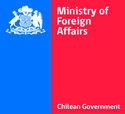The principles of our foreign policy are the essentials that uphold and give coherence to the decisions adopted by Chile in its international relations. They are the most significant guidelines that must be considered when establishing foreign policy goals.
The most legitimate and effective resource available to Chile when it comes to exercising its rights in the international arena is respect and utmost adherence to the legal instruments that govern international relations. International law is, in turn, the main instance by which it is possible to limit the use of force in relations among States. In this regard, its observance is an essential condition for the preservation of peace and security in the international system.
Among the various elementary norms that define and shape international rule of law and promote peaceful relations among States, Chile attaches great value to the following:
- Validity and respect for treaties: International stability and peaceful coexistence of States are essential conditions for the development of nations. Respect for acquired commitments is, in this regard, a fundamental principle of our society. Therefore, in the international field, Chile attaches great importance to the fundamental value of treaties as a necessary condition for promoting peaceful international relations, legal security and cooperation among States through clear, stable rules.
- Peaceful settlement of disputes: By this principle, we renew our commitment to the prohibition of the use or threatened use of force in international relations, which are contrary to the principles set forth in the United Nations Charter, as well as our conviction that diplomacy and law are the only legitimate means for the settlement of international disputes. Chile, as a founding member of the United Nations (UN), abides by the strict application of its principles, supporting all initiatives leading to peaceful solutions to international conflicts.
- Independence and respect for sovereignty: Chile attaches great importance to the principle of equality among sovereign States as an essential basis for respect and peaceful coexistence among nations. Thus, our country is against intervention of one or more nations in the internal affairs of another, and believes that only international law can establish requirements and limitations upon them. Political and economic self determination of States and territorial integrity are fundamental values in that regard. While recognizing the evolution of international law in issues like human rights, we are of the view that humanitarian actions in qualified cases, authorized within the framework of the United Nations, can be used in face of situations that threaten or endanger the population.
- Territorial Integrity: Chile attaches great importance to the preservation of its territorial integrity and its political independence through diplomacy and the tools offered by international law. The characteristics of the Chilean territory, which includes maritime and air spaces as well as the Chilean Antarctic territory, imposes significant demands and responsibilities for our country.
Democracy is the political system which can provide for full respect for the essential rights of any human being. The values of tolerance, dialogue, equal opportunities, social inclusion and cohesion, as well as the full exercise of fundamental freedoms are better guaranteed in a context where the Rule of Law prevails and where public institutions operate effectively.
Chile appreciates that the rights of individuals, as inalienable features of any human being, be observed under any circumstance, at all times and places. Hence our adherence to international human rights protection instruments and mechanisms, which must complement national systems and be used when local resources are nonexistent o, even existing, are ineffective.
State and non-State actors interact internationally with increasing intensity. This scenario creates opportunities for cooperation for dealing with new challenges and threats jointly and with improved tools among States and between States and other international actors Thus, climate change, epidemics, food security, environmental degradation, ethnic conflicts, humanitarian crises, transnational organized crime, human trafficking among other emerging global situations, call for joint action.
A cooperative approach, with a comprehensive view is fundamental when addressing risks at the global level. No member of the international community willing to promote peace, security and common welfare can avoid that responsibility. Therefore, Chile is strongly committed to cooperating, through its technical and human resources, in all multilateral, global, regional, sub-regional and bilateral forums in order to contribute to solving some of these new and delicate problems that threaten the international community.
